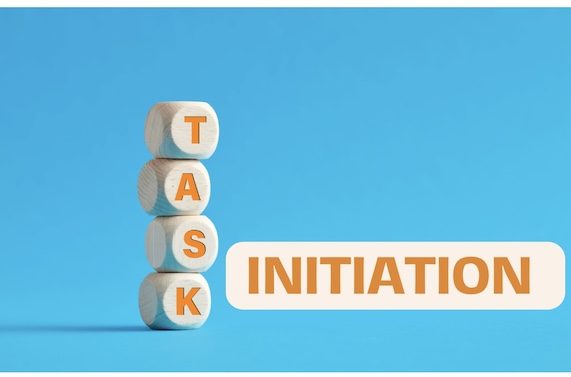
Written by Jennifer Cox LCPC
Let’s talk about Task Initiation, another Executive Function.
Task initiation refers to the process of starting a task. It involves identifying the task, setting goals or objectives, and determining the necessary steps or actions to be taken to complete the task. Task initiation is an important aspect of time management and productivity, as it helps individuals prioritize their tasks and allocate their resources effectively. It is often the first step to a task, where tasks are identified and organized before being executed.
Individuals with ADHD often face day-to-day challenges with task initiation. Here are some specific issues that can arise:
1. Difficulty starting tasks: People with ADHD may struggle to initiate tasks, even simple ones. They may find it hard to get started on activities like cleaning, organizing, or even getting ready in the morning.
2. Procrastination: Procrastination is a common issue for individuals with ADHD. They may delay starting tasks until the last minute, leading to increased stress and difficulty completing them on time.
3. Lack of focus and attention: ADHD can make it challenging to maintain focus and attention on a task. This can make it difficult to initiate tasks that require sustained attention, such as studying or working on a project.
4. Getting easily distracted: Getting easily distracted by external stimuli – They may find themselves getting sidetracked by unrelated thoughts, noises, or visual cues, making it harder to start and stay focused on a task.
5. Overwhelmed and decision paralysis: The overwhelming nature of multiple tasks or a complex task can lead to decision paralysis. Individuals with ADHD may struggle to prioritize and decide which task to start first, resulting in difficulty initiating any task at all.
6. Time management difficulties: People with ADHD often struggle with time management. They may underestimate the time required to complete a task or have difficulty estimating how long it will take to initiate and get started on a task.
7. Emotional barriers: Negative emotions, such as anxiety, frustration, or fear of failure, can act as barriers to task initiation. These emotions can make it challenging to take the first step and begin a task.
To address these day-to-day challenges with task initiation, individuals with ADHD can try the following strategies:
1. Break tasks into smaller steps: By making the steps more manageable, it can decrease the feelings of being overwhelmed and one can initiate easier. Allowing one to focus on starting with the first step rather than the entire task.
2. Use visual cues and reminders: Visual cues, such as sticky notes or reminders on a phone, can serve as prompts to initiate tasks. Place these cues in visible locations to help remind and motivate you to start.
3. Set specific goals and deadlines: This can provide structure and motivation. Break tasks into specific goals and set realistic deadlines to create a sense of urgency and accountability for each of the goals.
4. Set a time limit: Set a specific amount of time for how long you will work on the task. This can create a sense of urgency and help you stay focused.
5. Create a plan: Having a roadmap can make it easier to get started and stay on track. Think of how to make the task presentable and write it down.
6. Create a routine: Set aside dedicated time each day for specific tasks to create a sense of structure and routine. Develop a habit of task initiation.
7. Use timers and alarms: This could help create a sense of urgency and help with time management. Use them to remind yourself to start a task or to allocate a specific amount of time for task initiation.
8. Eliminate distractions: Put away your phone, close unnecessary tabs on your computer, and find a quiet space where you can concentrate.
9. Start with the easiest part: If the task feels overwhelming, start with the easiest part. By completing a small and manageable portion of the task, you’ll gain momentum and motivation to continue.
10. Practice self-compassion: Be kind to yourself and acknowledge that task initiation can be challenging for individuals with ADHD. Celebrate small victories and focus on progress rather than perfection.
11. Use positive self-talk: Use positive self-talk to motivate yourself and overcome any negative thoughts or doubts. Remind yourself of the benefits of completing the task and the satisfaction you’ll feel once it’s done. Mindset does matter.
12. Reward yourself: Give yourself a small reward for getting started on the task. It could be something as simple as taking a short break, enjoying a favorite snack, or doing something you enjoy after completing a certain portion of the task.
13. Seek accountability: Share your task with a friend, family member, or colleague who can hold you accountable. Knowing that someone is expecting you to start and make progress can provide an extra push to get started.
Remember, everyone is different, so it’s important to find strategies that work best for you and that may require some trial and error. Experiment with these tips and adapt them to your specific needs and preferences. It’s important to be patient with yourself and seek professional help if needed.
Understanding each of the executive functions and how they can impact your day to day, can help one understand why ADHD is a serious disorder – This is a disorder that involves self-control, self-care, self-regulation, and self-motivation to get through your day.
For more information or help with executive functioning, contact 815-363-0864 or info@echcounseling.com

